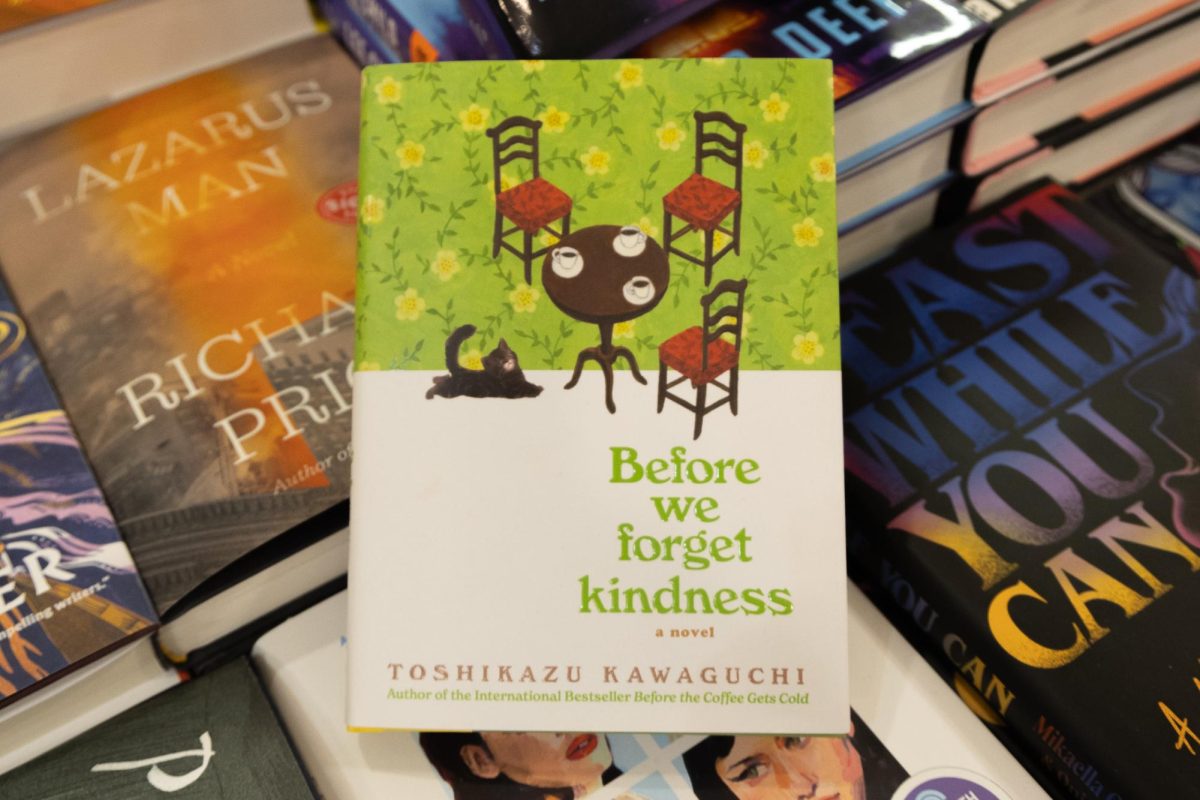Some people consume media for the thrill — they relish the suspense of a mystery novel, the action in an adventure movie or the high-stakes climax of a teen drama. Personally, I consume media for a source of comfort. I look for escapism in a cozy mystery, a predictable happily ever after or a lighthearted romance. When I discovered Toshikazu Kawaguchi’s novel “Before the Coffee Gets Cold,” I felt like I had struck gold. A series of wholesome and poignant short stories set in a back-alley Tokyo cafe were just my cup of tea.
Since the original bestseller’s release in 2015, the series has continued with four more internationally translated novels.
The fifth book in the series, “Before We Forget Kindness,” was published in the United States on November 5th. Each book takes place in the century-old Funiculi Funicula coffee shop, where visitors can travel back in time by sitting in a particular seat and drinking the magical coffee. However, this gift comes with strict caveats: The time traveler can never leave their seat, they can only visit those who have been to the cafe and they can never change the future. Most importantly, time travelers must finish their coffee and return to the present before their drink gets cold. Otherwise, they will be cursed and turn into ghosts.
Despite being unable to redress their regrets or alter the future, each customer braves time travel for a different reason. Kawaguchi’s stories are a beautiful exploration of love, grief, loss and regret. Though the novels have been criticized for their repetitive structure and unwavering sentimentality, there is something uniquely charming about each story. Throughout the series, grief is explored from the perspective of a mom who never had the chance to meet her daughter, a wife who lost her husband to Alzheimer’s and a man who lost his closest friend. Love is explored from the perspective of an old detective, a widow and a comedian.
In the latest addition to the series, “Before We Forget Kindness,” we meet four new guests: a wife holding an unnamed baby, a young boy with divorced parents, a woman who wants to give Valentine’s chocolates to her best friend, and a father who regrets losing touch with his daughter.
Each story adds to the series’ soothing atmosphere and breaks the reader’s heart in the most masterful ways. This book was a beautiful medley of longing and closure. Loss and grief were front and center in each story, and I found it to be the saddest book in the series by far. For instance, the tale of a widow desperate for her husband to name their baby before his death explored her heartache and the lengths one will go to to preserve memories of a loved one. The story stayed with me long after finishing the book and captured the raw emotions that make this series so powerful.
At under 250 pages, this book was also incredibly easy to fly through. If read consecutively, the repetition of the cafe’s rules in each book and the similar themes of the stories might become redundant, but after waiting a year for the latest book’s release, it felt like a ticket back to the warm and nostalgic world I had missed. The predictable storytelling framework and similar setup before each time traveler’s journey further reinforced the cafe’s comforting and ritualistic nature.
Kawaguchi’s descriptive visual language also creates an effortless narrative. For instance, he writes about characters’ appearances with simplicity, describing their demeanor with easily imaginable details like frayed sweater sleeves or “thread-like narrow eyes.” His uncomplicated prose makes the stories’ emotional intensity and characters’ inner struggles accessible to all readers. He plainly articulates the characters’ regret, happiness or sorrow, laying out their emotions like a roadmap for the reader.
One thing is certain: Kawaguchi’s fiction captures the intricacies of human connection with distinctive and moving techniques. Each story was a tearjerker, and each heartbreak felt like my own. The latest book in this timeless series, with the bittersweet nostalgia and warm familiarity of a magical Tokyo cafe, was the perfect source of escapism in the cold and gray New York winter.
Contact Jasmin Rostamirad at [email protected].























































































































































